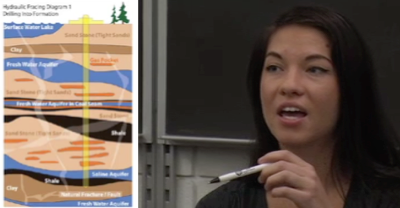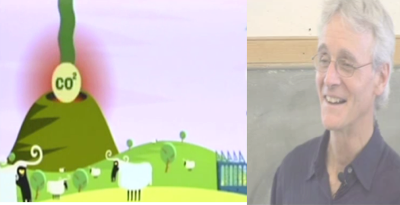Your Search Results (261) sorted by newest
Watershed Stakeholders
Media literacy and critical thinking lesson in which students analyze maps, videos and informational text to reflect on stakeholder interests in maintaining watersheds.
This lesson is part of a "kit" or collection of media decoding lessons on a particular topic. You can explore that kit using the link below:
Kit: Media Constructions of Sustainability: Fingerlakes
30-60 Minutes, Over 60 Minutes
Watersheds: Stewardship & Climate Change
Media literacy and critical thinking activity in which students decode web pages messages about which strategies might be most useful to deal with climate change impacts on human communities.
This lesson is part of a "kit" or collection of media decoding lessons on a particular topic. You can explore that kit using the link below:
Unit: Climate Change & WaterKit: Media Constructions of Sustainability: Middle School
15-30 Minutes
What About Bottled Water?
Media literacy and critical thinking lesson analyzing videos and TV commercials to discern messages about decisions to purchase or not purchase bottled water.
This lesson is part of a "kit" or collection of media decoding lessons on a particular topic. You can explore that kit using the link below:
Unit: Water (upper elementary)Kit: Media Constructions of Sustainability: Upper Elementary
Over 60 Minutes
What Do You Know? Sourcing, Credibility and Bias
Media literacy and critical thinking lesson reflecting on sourcing, credibility, accuracy and bias of information presented in the media while introducing students to vocabulary and issues addressed in Media Constructions of Sustainability lessons.
This lesson is part of a "kit" or collection of media decoding lessons on a particular topic. You can explore that kit using the link below:
Kit: Media Constructions of Sustainability: Food, Water, and Agriculture
30-60 Minutes
What Is Causing Global Warming?
Media literacy and critical thinking lesson analyzing conflicting perspectives on the causes for global warming by decoding short excerpts from two films, The Great Global Warming Swindle and An Inconvenient Truth.
Over 60 Minutes
What is the Role of the Federal Government in Protecting the Environment?
This is a media literacy and critical thinking activity in which students analyze three short news reports for conflicting messages about the appointment of Scott Pruitt to head the Environmental Protection Agency.
15-30 Minutes
Where Does My Food Come From?
Media literacy and critical thinking lesson analyzing videos to discern messages about the production and transportation of food.
This lesson is part of a "kit" or collection of media decoding lessons on a particular topic. You can explore that kit using the link below:
Unit: Food ChoicesKit: Media Constructions of Sustainability: Upper Elementary
Over 60 Minutes
Where Does Water Go?
Media literacy and critical thinking lesson analyzing videos to discern messages about the role of the hydrologic cycle in creating watersheds.
This lesson is part of a "kit" or collection of media decoding lessons on a particular topic. You can explore that kit using the link below:
Unit: Water (upper elementary)Kit: Media Constructions of Sustainability: Upper Elementary
Over 60 Minutes
Who Owns the Water?
Media literacy and critical thinking lesson exploring how water rights decisions impact communities by decoding excerpts from four films.
This lesson is part of a "kit" or collection of media decoding lessons on a particular topic. You can explore that kit using the link below:
Kit: Media Constructions of Sustainability: Food, Water, and Agriculture
30-60 Minutes
Who Stewards Seeds?
Media literacy and critical thinking lesson comparing varied perspectives about the best approach to stewarding corn seeds by decoding six video clips.
This lesson is part of a "kit" or collection of media decoding lessons on a particular topic. You can explore that kit using the link below:
Kit: Media Constructions of Sustainability: Food, Water, and Agriculture
Over 60 Minutes
Why Protect Our Water Resources?
Media literacy and critical thinking lesson analyzing book and report covers and tables of contents to discern messages about how people impact water supplies and what individuals and communities can do to protect water resources.
This lesson is part of a "kit" or collection of media decoding lessons on a particular topic. You can explore that kit using the link below:
Unit: Water (upper elementary)Kit: Media Constructions of Sustainability: Upper Elementary
Over 60 Minutes
Wind Farm Site Selection: A Community Debates the Issues
This is a media literacy and critical thinking activity in which students analyze two op-eds for perspectives on siting local wind farms.
15-30 Minutes
Wind: Benefits and Costs
Media literacy and critical thinking activity in which students decode a book cover and a tweet for messages about how human use of natural resources for energy affects the biosphere.
This lesson is part of a "kit" or collection of media decoding lessons on a particular topic. You can explore that kit using the link below:
Unit: Energy SourcesKit: Media Constructions of Sustainability: Middle School
30-60 Minutes
Young People Taking Action to Protect our Warming Planet
This is a media literacy and critical thinking activity in which students analyze four short excerpts from online articles for messages about youth activism for environmental protection and social justice.
This lesson is part of a "kit" or collection of media decoding lessons on a particular topic. You can explore that kit using the link below:
Playlist: Climate Change
30-60 Minutes
Youth, Hip Hop & Climate Change
This is a media literacy and critical thinking activity in which students analyze two short hip hop music video to compare different approaches to encourage youth activism to deal with climate change.
15-30 Minutes
Briefing: Project Look Sharp's Decoding Media Constructions and Sustainability
Antonio Lopez, in his coda to Greening Media Education, summarizes the complex set of skills needed “to bring ecologically oriented cultural practice into the realm of media education (which) promotes systems thinking, collaborative learning, critical thinking, lifelong learning and digital media literacy.” This article offers cases studies of two Look Sharp lessons, one for elementary age students and another for upper level high school, each of which was designed with these skills in mind as a way to bring Lopez’s vision into practice in the classroom.
College Level: Hydrofracking, Media and Credibility
Related to kit: Media Constructions of Sustainability: Fingerlakes
This 9 minute annotated video demonstrates constructivist media decoding using the lesson "Exploring the Impact of Hydrofracking on Aquifers," where college students analyze pro and anti-fracking diagrams.
View
Constructivist Media Decoding
Critical Thinking And The News
Assessing Credibility & Bias
Document Selection
Question Design
Social Studies
Science And Environment
High School Science: The Great Global Warming Swindle
An example of leading a class through a constructivist media decoding using a lesson from our kit, Media Constructions of Global Warming. Students analyze a short video clip from the film The Great Global Warming Swindle, compare the information in the clip with a chart, and reflect on issues of credibility and bias in media representations and our own biases when evaluating information.
View
Constructivist Media Decoding
Critical Thinking And The News
Assessing Credibility & Bias
Science And Environment
Where Media Literacy Meets Sustainability Education
Related to kit: Media Constructions of Sustainability: Fingerlakes
The webinar offers educators and teachers-in-training pedagogical techniques and curriculum materials to support constructivist media decoding to help students engage in critical thinking about the complex environmental, economic and social systems that underly sustainability.
View
Constructivist Media Decoding
Assessing Credibility & Bias
Science And Environment
Passenger Pigeon Memorial Webpage
Students analyze a webpage for messages about the last passenger pigeon and about benefit and harm in media messages. This simple decoding activity has been taken from a larger lesson with many slides titled “History of Endangered Species." To access this lesson, type the title with quotes into the PLS keyword search bar.
Under 15 Minutes




















